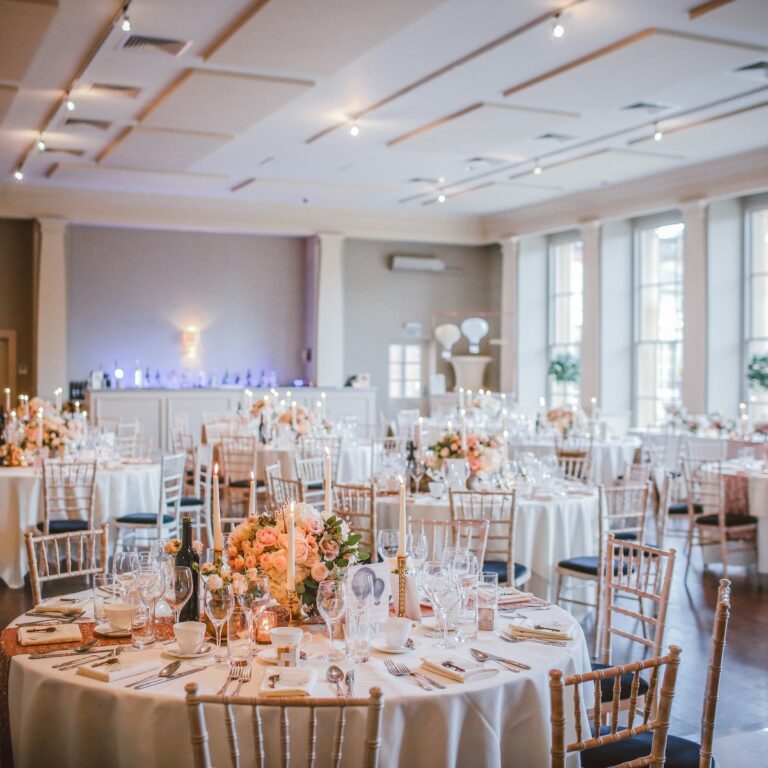The average cost of a wedding in 2024 exceeds $30,000. This figure varies by location and study, obviously, but the results always point to one inescapable truth: everything costs so much more than you think it will when you first start planning.
Venues, catering, attire: what begins as one tiny overage here and there quickly turns into a ruined budget, and probably a few arguments between you and your fiancé.
What can couples do when their wedding goes way over budget? Is there a way to get the wedding finances back under control before it’s too late?
Fortunately, the answer is a resounding “yes.”
34 Solutions to An Out-of-Control Wedding Budget
1. Crunch the numbers again; you might be wrong about the budget.
It’s possible you’ve miscalculated your figures, and you’re not over your wedding budget at all.
Or maybe you’ve gone over in some categories, but are under for so many others, it balances out.
Run those numbers through a calculator again, just to be sure. Even if it turns out the damage is worse than you initially thought—it’s always better to know than bury your head in the sand.

2. Accept that your budget was too low or unrealistic anyway.
One wedding I was in started out with a budget of $5,000.
It sounds ridiculous in 2024, but keep in mind this was over ten years ago—that really wasn’t an unusual number. On the frugal side, definitely. But possible.
The trouble was, the bride and groom quickly ran way over that figure. It wasn’t because they chose lavish locations or options—they just had a lot of guests to accommodate and feed, and didn’t realize their city’s high cost of living also translated to weddings.
They realized their original budget wasn’t realistic, and upped it to about $10,000. Still modest, but enough to cover everything they needed.
It’s possible you’ve gone over budget because you didn’t know what things actually cost in your area. It’s okay: now you have real numbers, instead of guesses or wishful thinking, and can adjust accordingly.
3. Don’t fall for the “sunk cost fallacy” of forfeited deposits.
The sunk cost fallacy is the wrongful belief that giving up on something we’ve invested time or money into would be a waste—when truthfully, it’s the best thing we can do for ourselves.
Some brides get skittish about abandoning their venue or caterer for someone cheaper, because they won’t get their deposits back. That’s wasted money, right?
But look at the big picture. If the new caterer is only $2,000, compared to the $4,000 of your old one—that $300 deposit you’ll lose is still worth the trade.
Don’t think about the money you’ll “lose.” Think about how much you can save.
4. If you have enough time, move your wedding to a later date.
Obviously, you can’t move your wedding date in every situation. But if it’s more than several months out, and you know guests haven’t made travel or hotel arrangements yet—feel free to bump it back.
Moving your wedding to a later date gives you more time to save money, and gives your budget breathing room.
5. Ask your vendors for cheaper alternatives.
Don’t assume your vendors are stuck at their quoted prices.
I don’t mean haggling—just exploring what options they have for tighter budgets.
Maybe the caterer quoted you for a three-course dinner because that’s what you wanted originally, but they do have a cheaper “appetizers-only” option that’s perfect for you (and your wallet).
Or perhaps your venue has some off-season dates available for way cheaper, and it’s just a matter of a phone call to move your wedding—and save thousands in the process.
Be upfront with them and say you’re over-budget: “We’re looking for areas to trim costs. Do you have any less expensive alternatives we can sub in?”
Yes, you’ll feel a little like a cheapskate at first—but don’t be ashamed. There’s nothing stingy about trying to keep a wedding within its budget.
6. Get ruthless with your guest list.
There’s no way around it: the more people you invite, the more money your wedding will cost.
Culling the guest list is the simplest way to get your wedding budget back under control. Of course, that doesn’t mean it’s easy.
Start with distant friends or relatives you aren’t close to. Alternatively, try eliminating by group: work friends, college buddies, etc. Sometimes it’s easier to cut a category altogether than it is to cross out individuals.
You can also eliminate plus-ones, but exercise caution. Anyone attending who really only knows you or the groom should be allowed to bring a date, so they have company. (Though you might also be able to eliminate that person altogether: if they don’t know any of your loved ones or friends, ask yourself if they really know you all that well, either.)
Engaged or cohabitating couples should also both get invites. Long-term (but not living together) dates are a tougher call, though I’d generally include them. New romances don’t require plus-ones, however.
7. Change the time of your wedding to a non-meal window.
Guest count brings down the wedding total a lot, but so does the food.
If your catering costs are spiraling way over-budget, consider moving your reception to a time when guests won’t expect a meal. Entrees and sides are way more expensive than h’ors douvres, and a cocktail party-style reception can feel just as hospitable.
No matter what time your reception falls, however, feed your guests. It doesn’t have to be a full meal, but it’s got to be something.
8. Change the day of your wedding to a Friday or Sunday.
Venues often give significant discounts to couples getting married on Fridays or Sundays, rather than the ever-popular Saturday. The cheaper price is because fewer people choose those days, but the venue still needs to max out those slots.
The price difference can be thousands of dollars, with Sundays usually being even cheaper than Fridays, so it’s worth asking your venue coordinator about those alternatives.
Of course, the downside is that there’s a reason most people don’t pick Friday or Sunday. Fridays are when people are tired from work, and can’t always get the time off to attend.
Meanwhile, Sundays mean no sleeping in the next morning—kids have school, and workweeks are starting.
Depending on the timeframe you’ve chosen for your wedding, however, these less popular days can be perfect.
Late Friday weddings (about 6 pm to 11 pm) give guests enough time to get off work, get ready, and sleep in the next day. Early Sunday weddings, with brunch or lunch receptions, save on catering costs while still giving guests time to unwind and prepare for their weeks.
Another monetary bonus: people usually drink less alcohol at Sunday brunch/luncheon receptions. Dry weddings are also pretty popular on Sundays, since alcohol isn’t as expected as it would be during a Friday or Saturday night.
9. Opt for a cheaper venue.
Besides guest count, catering, and date, your next largest wedding budget factor is the venue itself.
Picking a less expensive one is another one of those “simple but not easy” tasks. You might have a specific wedding aesthetic in mind already, and your dream venue suits it perfectly.
Or you found a location with special meaning: the church and reception hall where your parents got married, for example.
But with enough research (and more than a few venue tours), you can find locations you love, without a $10k+ price tag.
Brainstorm non-traditional venues, such as concert halls, university campuses, or state parks. Local marinas sometimes rent waterfront areas and buildings out for events. Ditto on community centers.
You can also explore backyard options: yours or someone else’s. Just be warned that the expenses can add up, especially if the wedding is large. Landscaping, tents, dance floors, and table or chair rentals (not to mention bathrooms) are just a few elements to consider when setting up a DIY venue.
10. Hand-deliver local invitations.
The last wedding I was in, the bride had to spend nearly $500 in postage alone.
Stamps are expensive—especially if you have heavy cardstock or large invites, requiring extra postage. Doubly so if you’re going with traditional RSVP cards.
While some old-school etiquette experts say it’s tacky to hand-deliver your wedding invitations, others say it’s perfectly fine. In this day and age when so much is digital, just the thoughtfulness of a physical, printed invitation seems like plenty.
Save yourself a few hundred bucks and deliver your local invitations by hand, then mail the out-of-town guests’ invitations.
11. Purchase your wedding dress second-hand.
You know how new vehicles take a huge depreciation hit as soon as they leave the lot? The same holds true for wedding dresses!
Most wedding dresses are only worn once, and kept in great condition—maybe a few grass stains here or there, but nothing a good dry cleaners won’t fix.
Scour thrift stores, secondhand bridal boutiques (online or in-person), or ask around to newly-married brides and see what you can find. Even a not-quite-perfect preowned dress that needs cleaning and alterations will save you hundreds or thousands compared to buying brand-new.
12. Put the groom and groomsmen in formal clothes, but not tuxes.
Tuxes look great, as do custom-fitted suits—there’s no denying that. But nowadays, so many formal looks can be put together for a fraction of the price.
Dress shirts, khakis/dress pants, ties or suspenders, and nice shoes can run as low as $100 per person, compared to the hundreds of a suit or tux rental.
Alternatively, ask the outfitter if they have any budget-friendly suit options that are similar to your first choice. That designer collection is irresistible…but the Men’s Wearhouse version might make you swoon over your groom just as much, for hundreds cheaper.
13. Downsize the bar menu to wine and beer only.
Liquor costs far more than beer and wine (good liquor, anyway!), so consider nixing it from your wedding reception. A few good beer options and a small variety of wine will appeal to most guests just fine.
What’s more, you can stock your own bar for much cheaper. Bulk wine and beer purchases run into the hundreds or low thousands, while comparable amounts of liquor can easily double that budget.
Another bonus is that guests don’t get as drunk on beer and wine. Liquor often makes going overboard all too easy. With beer and wine (or equivalents like hard seltzers), pacing yourself comes more naturally.
Note: some venues insist they supply the alcohol, not you. See if it’s cheaper to forgo liquor and cocktails, or if the difference is negligible; some will “build in” the cost of the liquor regardless.
14. Have a “stock the bar” party in leiu of gifts.
Why “instead of” gifts, and not in addition to? It’s just a personal rule of thumb, honestly.
I believe you should never ask guests to open their wallets more than twice: once for their travel and accommodations to attend your wedding, and once for your wedding present.
Not everyone agrees, however, and that’s fine. It’s not really the important part of this tip. Rather, what saves the overblown wedding budget is the “stock the bar” part.
Host a small event, or combine it with an engagement party or co-ed bridal shower—and ask guests to help stock your wedding bar. They can bring wine, beer, liquor, or any combination you think is best.
Stash your bottled gifts until the reception, and use those to replace or supplement your bar budget.
15. Go around the “wedding premium” to avoid markups.
Add the word “wedding” to anything, and watch its price quadruple.
Flowers, cakes, dresses…everything gets way more expensive once it’s for a wedding, even if it isn’t that different or special.
Explore some areas you can avoid the wedding premium. Grocery store sheet cakes for your guests, cut out-of-sight by the caterers, are a cheap complement to an elaborate cutter cake for the two of you.
If you’ve got the storage and know-how, ordering florals in bulk and making your own bouquets and centerpieces can save hundreds. Ditto if you opt for faux flowers in your wedding.
Use this tip with caution, however. There’s a reason some things cost more.
Example: Don’t tell your makeup artist she’s just being hired for a “formal event,” and then she arrives to see you in a wedding gown.
She isn’t charging you extra just because you’re a bride. It’s because you need different (and more expensive) makeup and products, so your look lasts all day through the hustle, bustle, sweat and tears.
In general, be honest with your vendors and anyone you’re hiring to provide a product or service. But if you’re shopping for something on your own, you can omit the word “wedding.”
16. Get rid of the flowers at your ceremony or reception (or both).
I’m not knocking flowers. They add elegance and romance to any space, and a gifted florist can create bouquets worthy of fairytales.
But yes: flowers are expensive. To buy, care for, and transport. Nixing them from the wedding budget can save lots of money.
You don’t even have to get rid of them entirely. Save the blooms for your bouquet, but not the aisle decor. Or give the wedding party bouquets and boutinierres, but skip flowers on the reception tables in favor of vintage books, lanterns and tealights, or faux flowers.
17. Start a side hustle and put all the money into your wedding fund.
Truthfully, there’s only so much you can cut from any budget before you have to admit the problem isn’t the expenses. It’s the income.
Even if you can cut more from the wedding budget, maybe you simply don’t want to. And that’s okay! Everyone has their non-negotiable, must-have wedding details.
Either way, whether you can’t cut the wedding budget down or don’t want to, you’ll need more income. A side hustle can supplement your existing paychecks, and make all the difference in your wedding fund.
Walking dogs on weekends, selling stock photography online, or delivering for Doordash are just a few side gig possibilities. For more ideas, check out my list of side hustles to cash-flow your wedding.
18. Get a second (temporary) job, or pick up overtime at work.
Sometimes side hustles just won’t cut it. Though they can bring in serious money, a second job or grabbing overtime at work—if it’s available—is more of a sure thing.
Infusing your wedding budget with more cash can be as simple as stocking shelves on weekends, or picking up a few extra hours at your current job for some sweet overtime pay.
Temp work can also be fruitful, either through a staffing agency, or as a seasonal employee in retail or the food service industry.
It might not be glamorous work, and you’re going to feel pretty exhausted working so many extra hours. But remember: it’s just temporary.
19. Sell your furniture and old kitchen appliances.
That ugly recliner your fiancé bought as a bachelor, or the “just for now” couch you thrifted in college that’s never quite made it to the curb?
Sell ’em.
Then sell everything you and your fiancé plan on “upgrading” via your wedding registry, from blenders to scuffed-up toasters. You won’t get top dollar for most items, but it’ll be something—and every penny added to your wedding budget helps.
As a bonus, you’ll clear plenty of space for the new gifts that will arrive soon.
20. Stop using credit cards for wedding purchases.
It’s tempting to reach for plastic when a wedding expense goes over budget, but resist that urge as often as you can.
The last thing you want to see when you wake up the morning after your wedding is a big credit card bill. And the interest that accumulates will translate to hundreds or thousands more than if you’d cash-flowed as much of your wedding as possible.
If you got a credit card just for the wedding, consider closing it—or at least reserving it for nothing but vendor deposits or temporary holds. (In other words: big items where gathering enough cash before a set deadline would be especially hard.)
Smaller wedding expenses like shoes or craft supplies should be purchased with cash or debit. Why? Because paying with our own money hurts far worse than paying with credit.
Our brains register credit card use differently than debit or cash. We spend more on impulsive add-ons with credit, not to mention the interest later on.
With debit and cash, we’re forced to really think about that purchase, and be more frugal with how we spend.
You can also try an envelope system for those smaller wedding expenses, setting aside specific amounts for things like makeup, decor supplies, and even your dress.
21. Delay your honeymoon.
I know, I know: the idea of riding off into the sunset and kicking off married life with a far-flung adventure is hard to give up!
But putting your honeymoon on the back burner, at least for a few months, will cut thousands from your wedding budget.
That money can pad catering costs, finalize venue deposits—think about the relief you’ll feel when everyone’s paid up. It’s more relaxing than even the fanciest vacation.
Besides, you’re not saying “no honeymoon ever.” Just for now. You and your spouse can throw your wedding monetary gifts into a honeymoon fund, and save for an even better trip in a few months.
22. Take a local “staycation” honeymoon instead.
Alternatively, consider downsizing the honeymoon. Staying local eliminates the flight costs, can translate to cheaper hotels, and still yields an incredible trip with your new spouse.
A bed-and-breakfast in the mountains or lakeside cabin will be just as romantic as that all-inclusive resort in Cancun.
After all, you’ll still be with the one you love, tucked away from the hustle and bustle of the real world. That’s all a honeymoon really needs, right?
23. Get married alone or in a small ceremony, but keep the big reception.
Of the two, receptions cost way more money than the ceremony. But if you’re going to cut one down, make it the ceremony.
Why? Because the reception is a thank-you for your guests for attending your wedding and supporting your marriage. You don’t want to skimp on their thank-you gift.
It’s also easier to trim a ceremony down, either by going to the courthouse or just having a private one—just you two, witness, and the officiant, or with select friends and family in attendance. You can have a quick wedding on the reception venue grounds, or find a free or inexpensive ceremony spot (a chapel or park, for example).
Admittedly, how much money this tip saves will vary. For some weddings, it eliminates an entirely different venue rental, transportation, and certain staff to set up chairs or decor.
For others, like ceremonies taking place at an all-inclusive venue, the amount saved is so negligible, it makes more sense just to keep the ceremony unchanged.
24. Ditch it all and elope.
This money-saving tip isn’t for every bride and groom, I’ll admit. But almost every couple certainly thinks about doing it, at least once!
When wedding stress and budget concerns pile up, it’s tempting to throw in the towel and say, “Screw it; let’s just elope.” Most people don’t follow through, because they really do want the traditional or big wedding. And that’s okay.
But if it’s become less and less of a joke when you say it—bringing a huge sense of relief every time you entertain the idea—you might actually want an elopement.
And, fortunately for you, that saves a ton of money.
Besides, you can always save up and have a big reception later, or a vow renewal. And elopements can still include some friends and family, a beautiful dress—whatever you feel like adding.
25. Replace a traditional wedding cake with other desserts.
Traditional, elaborate wedding cakes are stunning. I can’t deny it.
They also cost hundreds, compared to alternative dessert options like cookies, cupcakes, or donuts—all of which can be just as delicious, and still look incredible arranged on tiered plating.
Visit local bakeries and ask what cake alternatives they’re able to sell in large quantities. You probably aren’t the first bride to ask; skipping the cake has been a trend for well over a decade. And lots of bakeries, knowing this, offer alternative tastings where you can sample cupcakes, pastries, macaroons, or cake pops instead.
26. Hire an all-inclusive wedding venue.
It sounds counterintuitive, but sometimes the more expensive option upfront is the cheapest long-term.
An all-inclusive venue is a location where you can have your wedding and reception. They often provide the caterer, tables, chairs, linens, and even some staff like a day-of coordinator or bartenders.
What they offer varies, as does pricing. But getting all those elements built into one price can definitely be cheaper than cobbling all the details together yourself.
It also helps you set the right price from the start for your wedding budget, and often spreads deposits out differently—giving you and your fiance more time to save.
27. Replace live bands with deejays (but probably not your Spotify).
No hate to iPod and Spotify receptions; I’ve been to plenty, and they’re always a good time. If that’s the route you want to take, go ahead. Just make sure you’ve got solid back-up plans in place for dying phones, weak signals, and malfunctioning stereos.
Personally, I believe professional deejays are the way to go, unless you can fit musicians into your budget.
The reason why is that professional deejays and live musicians can read a room’s energy. They know what to play at just the right time: quiet, easygoing music when the guests are mingling…but upbeat songs when things start getting rowdy.
They’re also pros at catering to your unique crowd. If your guests are mostly families and older relatives, they’ll know to save those crass hip-hop songs for the after-party. Or, if your wedding is filled with other 20-something college kids like yourself—they’ll have the ideal playlist in mind.
Between the two, deejays are cheaper than live bands, because they’re just one person relying on pre-recorded songs—not several people playing them in real-time.
28. Do your own hair and makeup the morning of the wedding.
DIY doesn’t always save as much money as we intend it to. I know I spent hours spray-painting thrifted frames for my wedding, only to discover Wal-Mart had some for the same price I’d paid anyway!
Sometimes, though, DIY makes perfect sense.
Though professional hair and makeup artists are worth their price, you can opt to do yours solo and still get a great result. After all, no one knows your hair and skin better than you.
Watch some YouTube makeup and hair tutorials to get inspired and pick up extra skills. And make sure you practice—a lot—and invest in great products. Wedding day makeup and hair has to last all day, so bargain eyeliner isn’t gonna cut it.
29. Skip getting your nails done—close-toed shoes and clean fingernails will do.
It’s a small line item in your wedding budget, but hey: any money saved helps!
Going with a clean and classic look—well-manicured but not painted—looks just as great as fully-done sets. And closed-toed shoes or a long dress will hide your pedicure (or lack thereof) anyway.
You can also opt for a simple DIY manicure of pale pink or pearl white, or classic clear-coat. These options look beautiful in pictures without overshadowing your ring.
30. Go with cheaper rings, at least for now.
Speaking of rings: don’t feel pressured to get your “forever diamond” right away. Or at all!
Wedding bands run the gamut from budget-friendly, to damn-near-a-house-payment. Choosing something simple and inexpensive, even if it’s temporary until you can upgrade, will help get your wedding budget back on track.
31. Ask for your monetary gifts in advance (with a caveat).
It’s a big wedding etiquette no-no to ask for money in some cultures. Even if you know people will cut checks left and right, it’s considered rude to just assume.
But what if you really do know money is on the way? Is it really that rude to ask for it before the wedding, rather than after?
That’s where the caveat to this tip comes in: it depends on who you’re asking.
Parents, for example, are a little different than “regular people.” They usually don’t mind when we directly ask for help, or when we’re honest and say, “This gift will be so much more helpful if we can get it early, if that’s possible on your end.”
Ditto on close aunts or uncles, best friends—anyone who will forgive you for being blunt, but also give you honesty if they can’t swing an early cash gift just yet.
So to sum up: yes, it’s still kind of rude in some circles. But the right people won’t usually take it that way.
32. Check (and balance) your wedding budget every single day.
You can’t improve what you don’t track. If you’re trying to keep your wedding budget under control, you have to pay attention to it—even when the thought nauseates you.
Get into the habit of going over it daily, or at least weekly, with your fiancé. Add any wedding expenses that occurred since your last update, go over the category totals, and adjust as needed.
This can be a printed budget on paper, an app, or a Sheets doc saved on your phone—you can even send the document’s shortcut to your home screen, to see the wedding budget in a single tap.
33. Open a debit account that’s for all things wedding, and nothing else.
If you haven’t done so already, create a debit account that’s only for wedding expenses. This makes tracking your wedding budget so much easier, and also organizes your money in such a way that it curbs overspending.
Knowing you have X amount of money in the wedding account makes impulse purchases or add-ons less likely.
You also get peace of mind knowing the funds are separate and earmarked for certain categories.
34. Accept past decisions, and focus on sticking to the budget going forward.
Depending on how close your wedding is, or what categories you’ve overspent on, it might be time to face the music: you blew the budget. There’s no way to change that.
But that doesn’t mean you can’t do better going forward.
In fact, that’s all the more reason to try! Set a new budget, with updated category totals and expected costs—then do your best to stick to it.
Failures only happen when we refuse to learn from our mistakes. Don’t beat yourself up over this one, but don’t let yourself repeat it, either.
Don’t Stress: Blowing the Wedding Budget Can Be Fixed
Hopefully, this list has given you some ideas on how to get a wedding budget back under control.
You don’t have to do every item listed, of course—just a few can make all the difference in your bottom line, and get your wedding back to “affordable” territory.
The most important tip is to pay attention to your wedding budget. Don’t bury your head in the sand just because it’s stressful; that creates more stress!
Half the battle in breaking a pattern is to notice it—so now that you’ve caught the overspending, you can try your best to curb it going forward.









